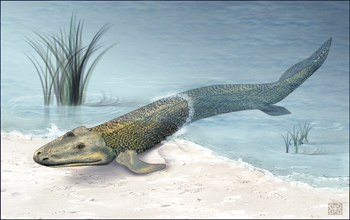Earth, 400 million years ago. It's not the sparkling gem of blue and green we see from space today. The oceans are still there, but the continents are mostly barren: plants emerged from the oceans only 30 million years ago. They are still concentrated along the coasts and in wet areas. Taking a closer look, we find a few arthropods have crept out of the water too. Sea scorpions pick up dead fish along the coasts, and a few insects buzz among the ferns. Most life is still in the water, though. This is the Devonian period, and something's about to change. 380 million years ago, the first vertebrates, amphibians, came out of the water. Fossils like Tiktaalik show the transition between the fins of fish and the feet of land vertebrates. They are some of the most incredible fossils, and provide a lot of information about the track life took on the early Earth.
A new fossil discovery adds a new twist to this story of life. A new -actually, a very, very old- set of fossil footprints has been discovered. They are obviously those of a vertebrate, rather than an arthropod. Just the fossil itself is exciting, but the twist is that it is 18 million years older than Tiktaalik and similar tetrapods. Even in geologic time, that's significant. That means that amphibians evolved, not in the middle of the Devonian around 380 million years ago, but 395 million years ago at the beginning of the Devonian. Also, these footprints aren't small; researchers estimate that the creature that made them was up to 3 meters (nearly 10 feet) in length. Thus, tetrapods and their predecessors, like Tiktaalik, had evolved much earlier than originally thought. Also, it means that the intermediate creatures were more successful than scientists had previously thought.
This discovery is exciting because it fundamentally changes the beginnings of land vertebrate, which later led to most of the animals we are familiar with today. I expect that this discovery will be followed up by not only more footprints, but by skeletal evidence as well. After all, we know what to look for now. As was the case with Tiktaalik, the fossil record suggested that there should be a specific type of creature between fish and amphibians in a pretty small range of rocks. Paleontologists looked there, and found it. This enlightening discovery will probably be followed up in a similar manner. It's an exciting example of how science is always changing.
Source: Science Daily- Fossil Footprints Give Land Vertebrates a Much Longer History
Tiktaalik
Subscribe to:
Post Comments (Atom)








